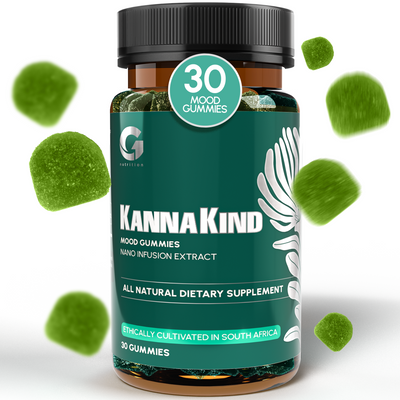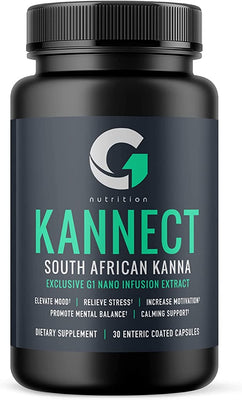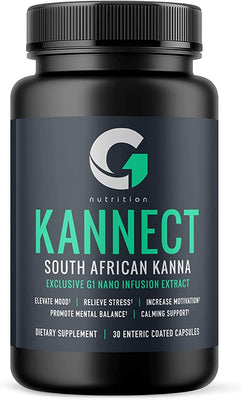Kanna, scientifically known as Sceletium tortuosum, is a plant native to South Africa that has been used for centuries to support mood, reduce stress, and enhance mental clarity. Its rise in popularity in modern wellness circles is due to its natural, non-addictive compounds that help people manage anxiety, improve focus, and support relaxation without the side effects of pharmaceutical alternatives.
This article will explore Kanna’s history, its active compounds, how it works in the body, modern uses, benefits, safety, and best practices.
By the end, you’ll understand why Kanna is a trusted plant-based supplement for modern mental wellness.
Introduction to Kanna (Sceletium tortuosum)
Kanna is a succulent plant endemic to South Africa and has been used for thousands of years by indigenous peoples. Its compounds interact with the serotonin system in the brain, providing natural support for emotional balance, focus, and stress reduction.
What Is Kanna?
Kanna, or Sceletium tortuosum, is a flowering plant in the Mesembryanthemaceae family. It contains alkaloids such as mesembrine, mesembrenone, and mesembrenol, which are responsible for its mood-enhancing and calming effects.
These compounds work primarily as serotonin reuptake inhibitors (SRIs), which naturally increase serotonin levels in the brain, promoting relaxation, emotional resilience, and focus.
Why People Use Kanna
People turn to Kanna for:
- Mood support: Reduces daily stress and anxiety
- Focus enhancement: Improves productivity and mental clarity
- Relaxation: Supports restful sleep without grogginess
Compared to other herbal supplements like Ashwagandha or Rhodiola, Kanna offers faster onset effects and is enjoyed in chewable gummy, capsule, or tincture forms, making it convenient for daily use.
Read also Kanna vs. Other Natural Mood Enhancers to compare Kanna with Ashwagandha and Rhodiola.
The History of Kanna
Kanna has a rich history rooted in the traditions of South Africa. Its cultural significance and long-term use underscore its safety and effectiveness.
Kanna in South African Culture
The Khoisan and San peoples used Kanna for:
- Social interactions: To promote calmness and sociability
- Spiritual rituals: Enhancing connection with the environment and community
- Medicinal purposes: Relieving pain, stress, and fatigue
Historical records show that Kanna was chewed, smoked, or brewed into teas, demonstrating its versatile applications in daily life.
Traditional Preparation Methods
Preparation impacted the potency and effects of Kanna:
- Chewing: Provided slow, steady release of active compounds
- Smoking: Produced faster onset effects
- Brewing into tea: Offered mild, sustained relaxation
How Kanna Works in the Body
Kanna interacts with the brain in a natural, balanced way, promoting emotional and cognitive well-being.
Interaction with Neurotransmitters
Kanna’s primary mechanism is through serotonin reuptake inhibition. This leads to:
- Improved mood
- Reduced anxiety
- Enhanced emotional resilience
It may also affect dopamine and other neurotransmitters, supporting focus, motivation, and cognitive function.
Effects on Mood, Focus, and Relaxation
Short-term effects:
- Calmer state of mind
- Increased social comfort
- Faster onset of mental clarity
Long-term benefits:
- Enhanced resilience to stress
- Improved productivity and emotional balance
- Natural support for restful sleep
Read also How Kanna Works: Effects on Mood, Anxiety, and Focus for a deeper dive into neurochemical mechanisms.
Benefits of Kanna (Evidence-Based Insights)
Research supports Kanna’s benefits across mood, cognition, and sleep.
Mood Enhancement
Studies show Kanna can:
- Reduce anxiety and stress
- Improve social comfort and confidence
- Enhance overall emotional balance
Cognitive Support
Kanna improves:
- Focus and attention
- Working memory
- Mental clarity under stress
Expert Quote:
“Sceletium tortuosum provides subtle but meaningful support for both cognitive and emotional wellness, making it a valuable plant-based supplement.” – Dr. Amy L., Neuroscience Specialist
Sleep and Relaxation
- Promotes natural sleep
- Reduces nighttime awakenings
- Alternative to sedative medications
Safety, Side Effects, and Precautions
Who Should Avoid Kanna
- Individuals on SSRIs or other serotonin-altering medications
- Pregnant or breastfeeding women
- People with severe medical conditions
Typical Side Effects
- Mild headache
- Slight nausea or dizziness
- Rare digestive discomfort
Recommended Dosage and Best Practices
- Start with low doses (1 gummy or 50mg powder)
- Gradually increase based on tolerance
- Cycle use 5–6 days per week for long-term benefits
Modern Uses of Kanna
Today, Kanna is widely used in wellness routines for stress management, mood support, and focus.
Forms of Kanna Supplements
Featured Products
|
Form |
Pros |
Cons |
|
Gummies |
Tasty, portable, fast absorption |
Slightly higher cost |
|
Capsules |
Easy to dose, long shelf-life |
Slower absorption, harder to chew |
|
Powder |
Flexible dosing, mixable in drinks |
Bitter taste, less convenient |
|
Tea |
Gentle effect, traditional use |
Slower onset, variable potency |
|
Tincture |
Fast absorption, concentrated |
Alcohol content, stronger taste |
Read Kanna Supplement Gummies Benefits for product-specific guidance.
Kanna in Wellness and Mental Health
Kanna is commonly used for:
- Stress reduction: Natural anxiety support
- Productivity: Focus and mental clarity
- Emotional balance: Supporting mood during challenging days
Recommended dosing is 1–2 gummies per day for general support, adjusted based on individual tolerance.
Integration into Daily Life
- Morning use: Boost focus and mental energy
- Afternoon use: Reduce mid-day stress
- Evening use: Support relaxation and sleep
Pairing Kanna with practices like meditation, exercise, or mindful breathing can enhance benefits.
Conclusion
Kanna (Sceletium tortuosum) is a time-tested plant with modern applications in mood support, stress reduction, focus, and sleep. With careful dosing, safe use, and integration into wellness routines, Kanna provides a natural, plant-based alternative to traditional supplements.
For those looking for convenience and effectiveness, KannaKind gummies offer a nano-infused, lab-tested solution. Explore our other blogs for more information and links to cluster content.
Frequently Asked Questions
1. Is Kanna Addictive?
No, Kanna is non-addictive and safe for long-term use when taken responsibly.
2. How Long Before I Feel Effects?
-
Gummies: 15–30 minutes
-
Capsules: 30–60 minutes
-
Full benefits may appear after consistent use for 1–2 weeks
3. Can I Take Kanna Daily?
Yes, when following recommended doses. Cycle usage if desired to maintain effectiveness.
4. How Does Kanna Compare to CBD or Ashwagandha?
-
Kanna: Mood, focus, relaxation
-
CBD: Calmness, sleep support
-
Ashwagandha: Stress resilience, adaptogenic support
Read also Kanna vs. Other Natural Mood Enhancers for a detailed comparison table and analysis.



